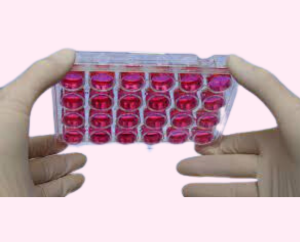
Stem cells in basic research
Stem cells play a crucial role in fundamental research in biology and medicine. They offer a unique opportunity to study the processes of development, cellular differentiation, tissue regeneration and disease, particularly in :
- Radiobiology : Stem cells are also used in radiobiology to study the effects of radiation on human tissues, using several biomarkers such as p53 Changes in the activity of this protein (responsible for cell cycle regulation and DNA repair) may indicate the presence of radiation-induced cellular stress. Also, the number of γ-H2AX foci (phosphorylated form of the histone H2AX protein) can serve as a biomarker of DNA damage and repair kinetics. (ATM, ATR, DNA-PK) which play a crucial role in DNA damage signalling and repair pathways.
- Understanding embryonic development: Embryonic stem cells (ESC) are used to study the early stages of human development. By growing these cells in the laboratory, researchers can observe how cells differentiate into different cell types, helping to understand the mechanisms underlying normal embryonic development and identify potential problems.
- Disease modeling: Pluripotent stem cells, such as embryonic stem cells and induced stem cells (iPS), can be programmed to differentiate into various cell types, including those affected by disease. This enables researchers to create cellular models of specific diseases, facilitating the study of underlying disease mechanisms and the search for new therapies. For example, to model neurological diseases, the expression of neuronal markers such as beta-III-tubulin can be used to monitor neuronal differentiation. On the other hand proliferation markers, such as the protéine Ki-67, are used to measure cell division activity. They are useful for understanding how disease affects the ability to stem cell proliferation.
- Cell differentiation studies: Stem cells enable scientists to study how cells specialize into different cell types during development. These studies help to elucidate the molecular signals, transcription factors and epigenetic processes that regulate the cell differentiation normal.
- Tissue regeneration research: adult stem cells, present in different body tissues, are being studied to understand how they contribute to tissue regeneration after injury or disease. This could lead to strategies to enhance the body's natural regeneration or develop assisted tissue regeneration treatments.
- Testing drugs and therapies: Stem cells can be used to test the efficacy and safety of new drugs and therapies. Cell models derived from stem cells can help predict how drugs interact with human cells and how they might affect certain medical conditions.
- Study of cancer mechanisms: Cancer stem cells, also known as tumor stem cells, play a role in cancer progression and recurrence. Understanding how these cells function can help develop more targeted treatment approaches for cancer.
- Gene therapy and genomics: iPS stem cells can be genetically modified to study the effects of genetic mutations or to develop gene therapy models aimed at correcting genetic mutations that cause hereditary diseases.

